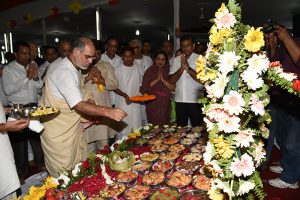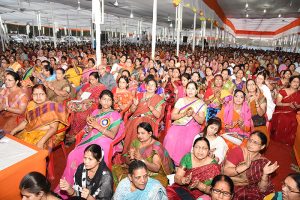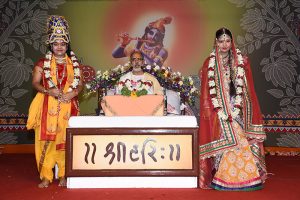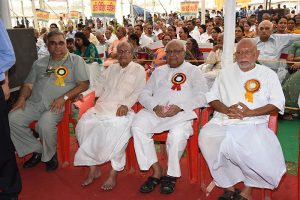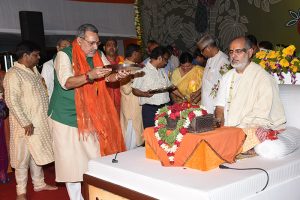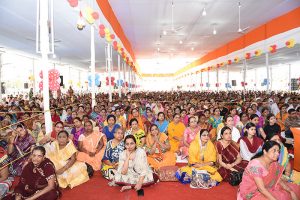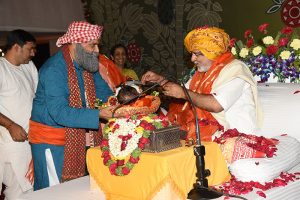A young man decides not to commit suicide after listening to katha – reveals Pujya Bhaishri in Patna katha
Adhyatma Satsang Samiti, Patna organised Pujya Bhaishri’s Bhagavat Katha in Patna from 25 March to 1 April 2015.
The CM of Bihar Honourable Shri Nitish Kumar specially attended the inauguration of this katha. After lighting the auspicious lamp, Shri Nitish Kumar described Pujya Bhaishri as a scholar-narrator of Shrimad Bhagavat. He expressed full confidence that the katha narrated by Pujya Bhaishri will spread the message of love in the society. He further requested Pujya Bhaishri to come to Bihar repeatedly to narrate katha. Many ministers came to hear the katha and sat through the entire session. Other spiritual and religious luminaries like Pujya Shri Chidanand Sarawati ji, and Shri Giriraj Singh also remained present.
At the beginning of the katha, Pujya Bhaishri gave beautiful descriptions of social, political and religious organisations. Generally speaking lust, anger and greed are considered undesirable. However, Pujya Bhaishri gave a beautiful example of how saints make good use of these in life. He then enlightened everyone on what righteousness is and what its true purpose is.
On the second day, Pujya Bhaishri posed the question: ‘What is the purpose of life?’ Talking about intellect and faith, Pujya Bhaishri explained that when the curiosity of the intellect is satisfied it transforms into faith. Though intellect is always in a flux, after completing a certain part of its journey it becomes full of devotion and the devotional journey of Shrimad Bhagavat fulfils that requirement of spiritual journey. While the journey of righteousness is based on material wherewithal, the spiritual journey is based on spiritual discipline (sadhana).
Later in the day, Pujya Bhaishri spoke about righteousness and love. He said that there are three methods of narrating katha. One is the Vyas’s method of narration, the other is Narad’s method of narration and the third is Hanumant method of narration. Pujya Bhaishri gave examples of Sugriv and Kumbhkaran and said that ego feeds on virtues. Hence, virtuous people should never entertain ego in their life.
On the third day, Pujya Bhaishri spoke about intellect, purity, spirituality, Yoga, sects and righteousness. He said that Ramayan, Mahabharat and Gita are not just books of philosophy but also mirrors. Forgetting our goal is negligence while displaying laxity in achieving our goal is laziness. An individual is intelligent and pure-hearted is a teacher, a person with purity is a saint and one who has neither intelligence nor purity, is an ordinary person. One must be cautious about a person who is highly intelligent but with absolute absence of purity.
The fourth day of the katha was Ram Navmi. Hence Pujya Bhaishri elaborated upon the significance of Lord Rama’s life. He said that God incarnates as a human being to show man how one can develop as a human being. Thereafter, Pujya Bhaishri spoke about the body and soul. He said that surrender was not a condition but implicit nature of love. A saint retains his solitude even in a crowd. He said that people invest money after a lot of thought and deliberation. But our breaths are more precious than money. Hence they should be invested much more thoughtfully and wisely.
On the fifth day Pujya Bhaishri explained that colleges teach students how to make money but satsang teaches us how to spend money. He raised the question, “What thoughts should we nurture and encourage? If our thinking is right our world will also be alright. It is very good to serve the poor, build hospitals, educate people and give in charity. But the need for satsang is as necessary for good and positive thoughts.
At this stage, recalling a real life incident, Pujya Bhaishri said that once a young man had lost all hope in life and had decided to commit suicide. However, he decided that before committing suicide he should hear Pujya Bhaishri’s katha which was to be held in his town. On the fourth day of the katha, the young man sent a note to Pujya Bhaishri saying that although he had decided to die, he had given up the idea after listening to his katha. The youth had further stated that henceforth he will bravely face all problems of life just as Arjun did after listening to Lord Krishna. An impromptu round of applause greeted Pujya Bhaishri’s narration of this incident.
Thus katha protects us against many ills such as weak thoughts, wrong acts, sin and indiscretion. Mother’s womb, father’s lineage, educational institutes and spiritual narration are the four sources of imbibing good values and thoughts.
On the seventh day Pujya Bhaishri delivered an oath of cleanliness and the Chairman of the Adhyatmik Satsang Samiti, Shri Vijay Kishor Furia ji, accepted the responsibility of cleaning up the katha venue after its completion.
Finally Pujya Bhaishri advised to serve parents and keep them happy. He said, “If you do not pay obeisance to your parents and beget their blessings, then the blessings of saints remain unfulfilled. When your parents are happy with you the blessings of saints begin showing results”. Such emotional words from Pujya Bhaishri imploring people to serve their parents drew tears rolling down the cheeks of most of the people in the audience.
Thus Pujya Bhaishri’s Patna katha turned out to be a very special one for the new ideas and interpretations that he enunciated in it.
